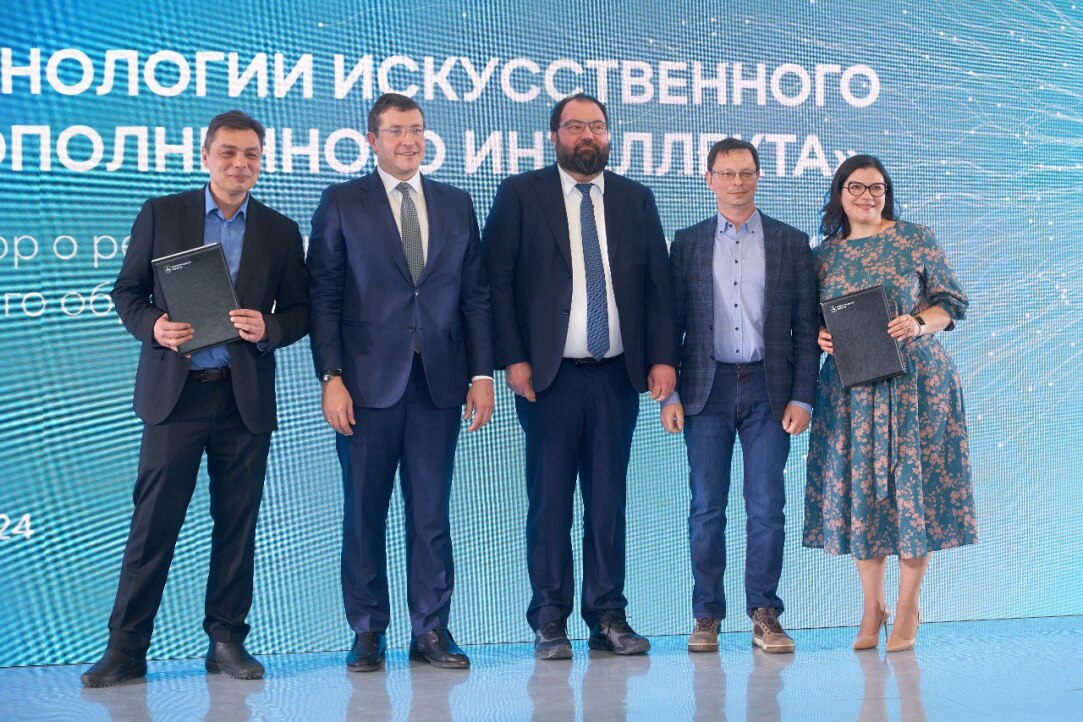HSE University and Neimark IT Campus Sign an Agreement on Launching an AI Network Programme

HSE University, together with the world-class Neimark IT campus, is preparing a unique professional environment for future IT specialists: to this end, an IT school will be created in the Nizhny Novgorod region, and on September 1st, the first network degree programme ‘Artificial and Augmented Intelligence Technologies’ will be launched at HSE University in Nizhny Novgorod.
The agreement on implementing the programme was signed in Nizhny Novgorod at a presentation on the complex development of an IT hub in the Nizhny Novgorod region which was delivered to the heads of federal IT corporations with the participation of the Minister of Digital Development, Communications and Mass Media of the Russian Federation Maksut Shadaev, Governor of the Nizhny Novgorod Region Gleb Nikitin and HSE University Rector Nikita Anisimov.
The agreement on the implementation of the first network programme of higher education ‘Artificial and Augmented Intelligence Technologies’ was signed by Anna Blyakhman, Director of HSE University in Nizhny Novgorod, and Valery Cherepennikov, Director of the Project Office of the Neimark IT Campus.
Students on the programme will study methods, models and concepts of artificial intelligence, acquire skills in the practical use of neural networks, image recognition and speech, and learn how to use data analysis and machine learning technologies throught the experiences of leading IT companies.

Gleb Nikitin
‘Artificial intelligence has become one of the key areas of training on the IT campus for a very good reason. Our region has accumulated serious experience in this area. Yuri Neimark stood at the origins of artificial intelligence in Gorky about half a century ago, and the OpenCV computer vision library, which Nizhny Novgorod engineers worked on, became a unique example of such products and features of IT in Nizhny Novgorod,’ says Gleb Nikitin, Governor of the Nizhny Novgorod region.
Admissions to the programme will open this year. Applicants must pass the Unified State Exam in mathematics, computer science and Russian language.
HSE University Rector Nikita Anisimov empahsised that the joint programme with the IT campus is unique in both its content and learning technology.
‘The programme combines the best teachers from HSE with experts from leading companies in the industry, who will jointly help students acquire skills on real projects. As a result, we will have highly qualified graduates with both the modern practical experience and soft skills necessary to solve problems of the future of the digital data economy,’ says HSE Rector.

Valery Cherepennikov
‘The programme is designed to give graduates a strong fundamental mathematical knowledge that provides the basis for intelligent solutions, and multiple practice-oriented courses that form skills in developing and implementing machine learning algorithms, as well as applying neural networks and deep learning to solve real problems. Industrial expertise and in-depth specialisation in these areas will be provided by the Neimark IT Campus. Throughout their study, students will participate in project activities, attend specialised courses from partners, workshops, and take part in special events. Thus, after graduation, we will have exceptional employees in great demand on the market,’ explaines Valery Cherepennikov.
‘For HSE University, the programme ‘Artificial and Augmented Intelligence Technologies’ is a natural step in the ongoing creation of an ecosystem for talented students who are passionate about IT technologies in Nizhny Novgorod. During their studies, students will be able to gain full-fledged developer experience, receive a number of additional certificates confirming their qualifications, and a ready-made portfolio of completed projects,’ adds Anna Blyakhman, Director of the HSE University in Nizhny Novgorod.
The projects for the development of the IT campus education system include creating a new educational space for future IT specialists, organised by the Neimark IT Campus and HSE University.
‘The project is unique not only due to its location within walking distance from the IT campus facilities, but also due to the concept of the educational process. We plan to enrol up to 1,600 school students into full-time studies. About a thousand more children from all over Russia will be able to study here remotely with modules in an offline format. The programme content will also be uniquel. It considers IT as a cross-cutting specialisation for all professional areas: from fintech and biotech to linguistics and urban studies,’ adds Gleb Nikitin.
See also:
HSE University and Sber Conduct Foresight in Artificial Intelligence
HSE University, in collaboration with Sber, have conducted a foresight study on artificial intelligence (AI). Its early results were discussed by the participants of a strategic foresight session on exploratory research in AI, held at the Coordination Centre of the Russian Government, headed by Deputy Prime Minister Dmitry Chernyshenko. The results from the foresight study will inform the Unified Research and Development Programme in the Field of AI.
White Papers of AI Conformity Assessment Published on HSE University Website
The Russian Technical Committee for the Standardization of ‘Artificial intelligence’ (TC164), together with the Chamber for Indo Russo Technology Collaboration and the RUSSOFT Non-profit Partnership of Software Developers, has published new White Papers related to Artificial Intelligence Conformity Assessment. It reflects the approaches to the standardization and ethical regulation of AI technologies in two pilot industries — healthcare and agriculture.
Space for Collaboration in Artificial Intelligence
The HSE Laboratory of Artificial Intelligence for Cognitive Sciences (AICS) has launched regular seminars, offering students and scientists from various universities and research centres the opportunity to share their latest research and discuss the most recent developments in artificial intelligence in a friendly and constructive atmosphere. The first seminar was held on May 15.
Scientists Propose Star-Shaped Diffusion Model
Scientists at the AI Research Centre and the Faculty of Computer Science at HSE University, the Artificial Intelligence Research Institute (AIRI), and Sber AI have come up with novel architecture for diffusion neural networks, making it possible to configure eight distinct types of noise distribution. Instead of the classical Markov chain model with Gaussian distribution, the scientists propose a star-shaped model where the distribution type can be selected and preset. This can aid in solving problems across various geometric modalities. The results were presented at the NeurIPS 2023 conference.
HSE Scientists Leverage AI to Accelerate Advancement of 5G and 6G Wireless Communication Systems
The HSE Artificial Intelligence Centre has developed software for modelling radio channels in 5G and 6G wireless networks, based on ray tracing and machine learning techniques. Their software solutions enable modelling radio wave propagation between transmitters and receivers and can convert ray tracing data into a frame sequence format, configure and train neural networks based on this data, and subsequently save the trained models.
‘Like Electricity, AI Can Bring Incredible Benefits’
Developments in the field of artificial intelligence are gradually taking over the world. AI has the potential to bring incredible benefits to the global economy and our quality of life, but it also creates new challenges. Panos Pardalos, Professor at the University of Florida, Academic Supervisor of the Laboratory of Algorithms and Technologies for Networks Analysis (Nizhny Novgorod), covered these issues, along with other related topics, in his recent report.
‘You Need to Know a Lot of Ideas and Algorithms, Come Up with Something Unconventional’
A student of the HSE Faculty of Computer Science, Andrey Kuznetsov, has become the winner of the 2024 Data Fusion Contest. He took first place in solving geoanalytics tasks, and also won the special ‘Companion’ category. The competition took place as part of the 2024 Data Fusion conference on big data and AI technologies. Researchers from HSE University presented the results of their work and demonstrated applied developments at the conference.
‘We Need to Learn to Communicate with Artificial Intelligence Services’
An online course 'What is Generative AI?’ has been launched on the Open Education platform, which will help students learn more about how to properly communicate with neural networks so that they can perform tasks better. Daria Kasyanenko, an expert at the Continuing Education Centre and senior lecturer at the Big Data and Information Retrieval School at the Faculty of Computer Science, spoke about how generative AI works and how to create content with its help.
Artificial Intelligence Tested by Kant Philosophy
The Baltic Federal University (Kaliningrad) recently hosted an International Congress entitled ‘The World Concept of Philosophy’ in honour of the 300th anniversary of the birth of the philosopher and thinker Immanuel Kant. The event brought together about 500 scientists and experts from 23 countries. HSE Rector Nikita Anisimov took part in the opening plenary session of the congress titled ‘Critique of Artificial Intelligence: Being and Cognition in the Context of Artificial Intelligence Development.’
HSE University to Reward Students Who Write Their Thesis Using AI
HSE University has launched a competition for solutions using artificial intelligence technology in theses work. The goal of the competition is to evaluate how students use tools based on generative models in their 2024 graduation theses (GT).




